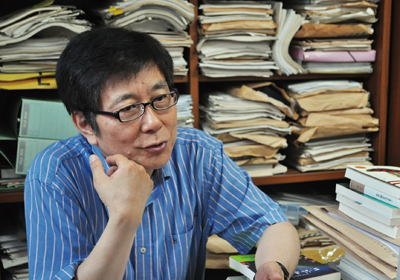
“Numerable themes and ideas of renowned fantasy novels are retrieved from ancient mythologies and legends. The Harry Potter series, known to be the most creative and influential fantasy novel in this century are actually based on the Celt civilization,” said professor Jung Jae-seo (Chinese), who strives to find a breakthrough in Korean fantasy with devotion to Asian traditions and ancient legends.
Professor Jung, also known as a cultural critic, argues that more fantasy novels should be based on Asian traditions and legends. Jung’s devotion to the study of and ancient culture and legends of Asia had led him to author more than 24 books, many of which are commonly used as university text books.
On June 30, Jung was invited as a member of the judging committee in The 3rd Chosun Fantasy Literature Award, which is the largest fantasy literary award in Korea, held by Chosun Ilbo. The annual awards aims to discover new and promising writers for the Korean literary industry and the entries are evaluated according to their traditionalism, originality, and creativity.
Judging the works of budding writers for three consecutive years, Jung’s most important standard of evaluation has always been the work’s traditionalism. He believes that fantasies and myths should always carry the identity and symbol of a particular culture and region.
However, he was disappointed in previous years when he encountered many works simply mimicking famous Western-style fantasy novels, based on Western history and traditions.
This year, he was able to identify stories that incorporated Korean identity and Asian culture. Two pieces of literature were awarded as this year’s grand prize. “Kingdom of the Leaf” by Kim Jae-suk, is about summoning ancestors from the grave to cure illness which is a concept commonly manifested in Korean traditional shamanism. “Journey to Dowha Village” by Jung Jin-young, the second award winning piece, depicts the Koreans’ traditional concept of utopia which is a paradise garden full of peach trees.
“The two literatures reinterpreted Korean traditional features and applied them to fantasies in a creative sense. The two pieces proved the potential of Korean fantasies,” professor Jung said.
He claimed that the winning novels reminded him of the revival of the most popular Korean fantasy novel “Dan” written in the 1980s. Dan was the first novel depicting Taoist magic and Asian religious traditions that influenced the region for over two thousand years.
“I believe that novels like Dan gained immense public support in Korean society due to its adherence to our own tradition. Readers were able to be familiarized and entertain themselves with the story.” professor Jung criticizes ancient cultures and relics displayed on the shelves of museums with no liveliness. He claims that the revival of Asian fantasy novels depends on contemporary writers and readers’ interest and enthusiasm for Asian and Korean tradition and history. He expects to encounter more playful fantasy novels picturing our forgotten traditions fused with contemporary settings.
“Countless mythical stories preserving Asian and Korean traditions are waiting to be uncovered, examined and studied at this very moment,” professor Jung said.
Lee Ji-hyun
jihyune2@ewhain.net

